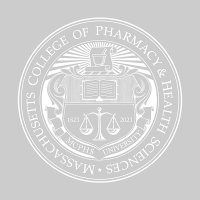Pharmacy Student Researcher Targets Critical Care Treatment Options
Jennifer PersonsSarah Beasley explores hydromorphone as an alternative to fentanyl in ICU patients and presents research to leaders in critical care at a national meeting.
In late 2022, Lahey Hospital & Medical Center in Burlington, MA experienced a fentanyl shortage due to purchasing issues. The opioid is used to ease pain for patients in the intensive care unit (ICU) who are on a ventilator, which helps them breathe. So, the hospital switched to hydromorphone, a less potent opioid.
But did the switch have any negative impact on patients? Is hydromorphone safer? And should it be used over fentanyl more often? Massachusetts College of Pharmacy and Health Sciences (MCPHS) student Sarah Beasley, PharmD ’26, spent the better part of a year trying to answer these questions.
“We wanted to determine if there was a difference in mortality rates between patients who were on fentanyl or hydromorphone within 28 days of being put on the ventilator,” she explained.
She took her work to the Society of Critical Care Medicine’s (SCCM) Annual Critical Care Congress in Phoenix this January.
“We wanted to present somewhere, and this meeting seemed to be the most important one we could go to with these findings,” she said. “It was my first professional presentation, and people were very surprised that I was there as an undergraduate student.”
The annual event features presentations on the latest knowledge and research in critical care, typically by post-graduate residents, fellows, or even practicing clinicians —not undergraduate students like Beasley.
“Sarah did a wonderful job, and attendees who listened to her presentation were impressed by the rigor of her project and her professionalism,” said Philip Grgurich, PharmD, MBA, BCCCP, FCCM, Beasley’s faculty research mentor. “She performed sophisticated analysis that would typically be expected of a PhD candidate.”
Beasley’s journey with this work began last May when she and Dr. Grgurich teamed up for the Summer Undergraduate Research Fellowship (SURF). It took Beasley two months to review 500 patient charts.
She then spent another six months analyzing the data she collected, performing advanced statistical analyses thanks to her minor in Biostatistics from Simmons University through Colleges of the Fenway Cross-Registration.
After all that hard work, she found an answer.
“The data showed there wasn’t a difference in patient outcomes between those who received fentanyl infusions and those who received hydromorphone infusions,” she said. Of the patient cases she reviewed, Beasley’s analysis found patients on fentanyl lived 22 days without a mechanical ventilator within the first 28 days of intubation, while patients on hydromorphone lived 21 days. However, she noted hydromorphone was associated with a significant reduction in opioid exposure.
“It’s an encouraging result because it means hydromorphone, which hasn’t been studied much, may be used as an alternative to fentanyl,” she added.
Beasley explained that while there is a lot of research on opioids, there is not as much about their use in critical care, making the SCCM Congress an ideal place to present this work.
“People were interested in it because the analysis was complex. It was nice to see the attendees appreciate the work and listen carefully to the research. They seemed to be interested in what I had to say.”
Beasley and Dr. Grgurich are finalizing the statistical analyses and writing their manuscript. Once they’ve finished, they will search for a journal to publish their work. Meanwhile, Beasley will keep busy with her PharmD course load. Plus, she’s in the Honors Program and about to begin her Honors research project, an assignment she will work on during the last two years of her program.
“After this project, I’m always going to be open to topics in clinical research, which would be more statistical analysis, but I’m not afraid to go into cell research,” she said.
Beasley has already started putting out feelers with professors about research projects she may be able to join, something she has laid the foundation for during her early days at MCPHS.
“If I had to tell my first-year-self one thing, it would be to get to know your professors. Talk to them and see them regularly so they know your name and your interests. It goes a long way. If they see you putting in the effort to succeed, they will help you, especially in your later years.”
Beasley’s efforts have taken notice. “Sarah's work ethic and commitment to completing her project at the highest level are second to none. I hope other students can see how hard work and grit pay off,” Dr. Grgurich said.
Featured Connections
Schools
Programs
People

More University News
‘Purpose and Passion’: MCPHS Manchester Students Showcase Research
From pharmacy deserts to Gen Z learning strategies, student researchers explored timely issues shaping the future of healthcare.
Two Minds, One Mission: Bridging Psychology and Medicine
MCPHS researchers explore how mental wellness impacts physical health.
Research Team Searches for a New Diabetes Treatment
A medicinal chemistry student is exploring the possibility of a new method to treat Type 2 diabetes.
From Pharmacy to Advocacy: A Career Fueled by Service and Lifelong Learning
Symin Charpentier, PharmD '13, has curated a career that blends science, service, and advocacy. And it all began by joining the Navy after graduating from MCPHS.

